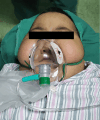Respiratory management of pediatric patient with bronchiolitis obliterans syndrome during general anesthesia surgery: a case report
- PMID: 40519745
- PMCID: PMC12163774
- DOI: 10.21037/tp-2024-607
Respiratory management of pediatric patient with bronchiolitis obliterans syndrome during general anesthesia surgery: a case report
Abstract
Background: Bronchiolitis obliterans syndrome (BOS) is a rare but severe noninfectious pulmonary complication that typically arises in the context of chronic graft-versus-host disease (cGVHD) following allogeneic hematopoietic stem cell transplantation (HSCT). Characterized by progressive small airflow obstruction and irreversible airflow limitation, it poses significant challenges in managing general anesthesia, especially in pediatric patients. There is currently no established consensus or clinical research on the optimal anesthetic approach for such cases, making this report noteworthy.
Case description: We report the case of a 6-year-old boy with BOS and steroid-induced obesity who had undergone HSCT for acute lymphoblastic leukemia and required general anesthesia for cataract surgery. He had severely reduced lung function and hypercapnia. Anesthesia was induced with propofol, rocuronium, and remifentanil, and mechanical ventilation was managed using pressure-controlled ventilation-volume guaranteed (PCV-VG) mode to minimize airway pressures and prevent barotrauma. The surgery was completed without complications, and the patient was safely extubated and discharged the next day.
Conclusions: This case demonstrates that the PCV-VG ventilation mode can be a viable option for managing pediatric patients with severe BOS undergoing general anesthesia. This approach can help achieve sufficient ventilation while minimizing airway pressures and the risk of ventilator-induced lung injury. This approach offers a viable anesthetic management option for similar cases in the future.
Keywords: Bronchiolitis obliterans syndrome (BOS); anesthesia management; case report; mechanical ventilation; pressure-controlled ventilation-volume guaranteed (PCV-VG).
Copyright © 2025 AME Publishing Company. All rights reserved.
Conflict of interest statement
Conflicts of Interest: All authors have completed the ICMJE uniform disclosure form (available at https://tp.amegroups.com/article/view/10.21037/tp-2024-607/coif). The authors have no conflicts of interest to declare.
Figures
References
-
- Shanthikumar S, Gower WA, Srinivasan S, et al. Detection of Bronchiolitis Obliterans Syndrome after Pediatric Hematopoietic Stem Cell Transplantation: An Official American Thoracic Society Clinical Practice Guideline. Am J Respir Crit Care Med 2024;210:262-80. 10.1164/rccm.202406-1117ST - DOI - PubMed
-
- Yousem SA, Berry GJ, Cagle PT, et al. Revision of the 1990 working formulation for the classification of pulmonary allograft rejection: Lung Rejection Study Group. J Heart Lung Transplant 1996;15:1-15. - PubMed
Publication types
LinkOut - more resources
Full Text Sources


